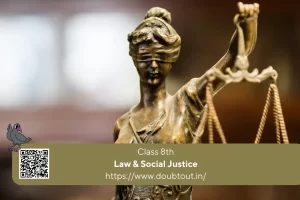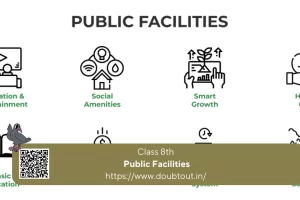
NCERT Solutions for Class 8 Civics Chapter 1 The Indian Constitution (Updated Pattern)

The key features of the Indian Constitution have been talked about in detail in this chapter. Given below are the important features of the Indian Constitution.
1. Federalism: The existence of more than one level of Government.
2. Parliamentary Form of Government: The right to vote for each citizen of the country irrespective of caste or creed.
3. Separation of Powers: The three organs of government – judiciary, legislature, and executive.
4. Fundamental Rights: The six major fundamental rights that every citizen of the country deserves as per the Indian Constitution.
5. Secularism: A country that promotes religious freedom for all its citizens.
1. Why does a democratic country need a Constitution?
Answer: There are various reasons why a democratic country needs a Constitution.
- The basic ideals on the basis of which we as citizens aspire to live in our country are mentioned in the Constitution.
- It tells the fundamental nature of society
- To define the nature of the political system of the country.
- It states a set of rules based on which people belonging to different religions and communities can peacefully co-exist with each other.
2. Look at the wordings of the two documents given below. The first column is from the 1990 Nepal Constitution. The second column is from the more recent Constitution of Nepal.
| 1990 Constitution of Nepal Part 7: Executive | 2015 Constitution of Nepal Part 7: Federal Executive |
| Article 35: Executive Power: The executive power of the Kingdom of Nepal shall be vested in his Majesty and the Council of Ministers | Article 75: Executive Power: The Executive Power of Nepal shall, pursuant to this Constitution and law, be vested in the Council of Ministers |
What is the difference in who exercises ‘Executive Power’ in the above two Constitutions of Nepal?
Answer: In Article 35 of the 1990 Constitution of Nepal, the power to rule the country, to set rules and to manage the country are all vested in the King of the country and the Ministers appointed under him.
However, Article 75 of the 2015 Constitution of Nepal states that the rules, governance and management of the country will be based on the laws mentioned in the Constitution of the country under the supervision of the Ministers.
3. What would happen if there were no restrictions on the power of elected representatives?
Answer: In a democracy, the citizens of the country are responsible for electing their leaders. However, there is always a possibility that the leaders might misuse their authority and use it for the wrong purposes. Hence, the constitution has provided measures to safeguard the country against such misuse of powers.
NCERT Solutions for Class 8 Geography Chapter 5 Human Resources( updated Pattern)
4. In each of the following situations, identify the minority. Write one reason why you think it is important to respect the views of the minority in each of these situations.
(a) In a school with 30 teachers, 20 of them are male.
Answer: The minority here are the 10 female teachers teaching in the school. It is important to keep the point of view of the female teachers in mind because despite being a minority, their opinions are of great importance, and no decision made keeping the majority views in mind should cause discomfort for the female teachers.
(b) In a city, 5 per cent of the population are Buddhists.
Answer: Here, the minority is the 5 per cent Buddhist population in the city. Their views should be respected. Just because they are in the minority with different religious beliefs, they should not be disrespected. Any decision should be taken keeping in mind the religious feelings of the Buddhist population.
THE NATURE CONSERVANCY: NURTURING A SUSTAINABLE FUTURE
(c) In a factory mess for all employees, 80 per cent are vegetarians.
Answer: The minority here are the 20 per cent of non-vegetarians having food at the factory mess. It is important that the food prepared in the factory mess must be prepared for both vegetarians and non-vegetarians.
(d) In a class of 50 students, 40 belong to more well-off families.
Answer: In this case, the minority are the 10 students who do not belong to well-off families. It is important to keep their viewpoints in mind because they may not be able to contribute to the various expenses required by the school and they should not feel humiliated for the same.
5. The column on the left lists some of the key features of the Indian Constitution. In the other columns, write two sentences, in your own words, on why you think this feature is important.
Answer:
| Key Feature | Significance |
| Federalism | It is important because, in a country like India, there are people living at different levels, and only one level of government cannot govern them. Hence, forming a government for the different levels is important. The Panchayati Raj is responsible for governing the village, the state government is responsible for governing the state, and the Central Government is responsible for governing the entire country. |
| Separation of Powers | There are three organs of governance: legislature, executive and judiciary. Each of these organs has different powers and serves different functions. In order to prevent the misuse of power by any one branch of government, the Constitution says that each of these organs should exercise different powers. |
| Fundamental Rights | Fundamental Rights are a set of rights that the Constitution offers to every citizen of the country. These rights include the Right to Freedom, the Right to Equality, the Right against Exploitation, the Right to Freedom of Religion, Cultural and Educational Rights and the Right to Constitutional Remedies. These rights give every citizen of the country the right to be considered equal, not to get discriminated based on caste, culture or religion, to get equal educational opportunities and to be equal in front of the law. |
| Parliamentary Form of Government | A democratic government is one where the citizens of the country have the right to elect their representatives. When the Constitution was being made, it was made sure that every citizen of the country, irrespective of caste, colour, creed and religion, would have the right to elect their leaders under universal adult suffrage, i.e., where the right to vote will be given to all. |
Tag:Civics, Class 8th, Social Science






